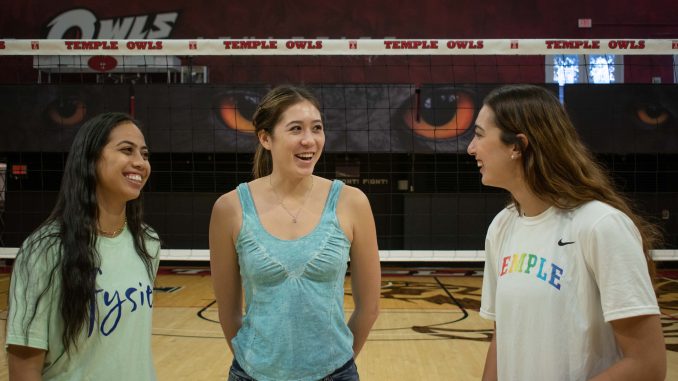
Being a captain doesn’t just mean looking out for the team on the court during a game or practice, but also building a team culture that supports the athletes.
Co-captains junior outside hitters Gem Grimshaw, Xeryah Salanoa and graduate student outside hitter Katerina Papazoglou are pushing Temple University volleyball to win games, but also creating a safe environment to talk about mental and physical health.
The Owls are working to combat the negative energy from a not-so-great performance this season with a record of 1-8 in conference play and 5-15 overall.
The team meets with Temple Athletics sports psychologists to check on players’ mental health, which has helped Temple push through the mental blocks that they are struggling with, like getting out of their heads and not getting down when they don’t win, said head coach Bakeer Ganesharatnam.
The captains also meet with Mental Performance Consultant Emily Galvin to discuss how they can support their team to stay focused with a clear mind and work as hard as possible for themselves and the team overall, Grimshaw said.
The three assessed how they could best support the team as captains and decided to create “DITHR”, which stands for discipline, integrity, trust, honesty and resilience — a code the captains have emphasized for the team to follow, Papazoglou said.
“As captains, we have to follow those things and we have to keep ourselves and our teammates accountable,” Papazoglou added. “I think it’s important, especially when it comes to the games and to the practice, and we need to trust each other and be honest with each other.”
Grimshaw, Salanoa and Papazoglou are held to a higher standard than other players because they are leaders for the team, but after meeting with a team psychologist, the development of those five principles only helped improve their leadership skills, Papazoglou said.
Although the Owls may not spend as much time together away from practice or games, they still designate time to work on team culture, even if it’s just studying with one another, Grimshaw said.
“All three of them are very different,” Ganesharatnam said. “Have very different personalities and qualities when it comes to leadership.”
Salanoa is on the shy side, but leads with her playing skills. While Papazoglou, who’s been in the program for five years, uses her experience and knowledge of the game to connect the team, Ganesharatnam added.
Grimshaw and Salanoa tend to be more reserved and quiet, but in practice they’ll challenge the team’s energy and momentum, especially when the team starts to get sloppy on their serves, Ganesharatnam said.
During games, Papazoglou is usually cheering on her teammates after an explosive play or will shout for the Owls to pick up the momentum, Ganesharatnam added.
The trio believes prioritizing mental health is a way to change the team dynamic to create a cohesive bond, so any player can freely speak about their feelings to their teammates, Salanoa said.
“It’s really kind of cool for us to see how they have developed in the last four or five years and have grown into this position,” Ganesharatnam said. “I could not ask for better captains on a team.”



Be the first to comment